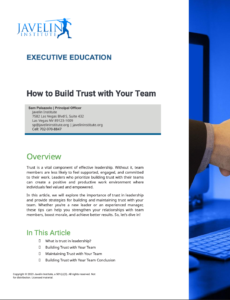The Point: Trust is a vital component of effective leadership. Without it, team members are less likely to feel supported, engaged, and committed to their work. Leaders who prioritize building trust with their teams can create a positive and productive work environment where individuals feel valued and empowered.
In this White Paper, we will explore the importance of trust in leadership and provide strategies for building and maintaining trust with your team. Whether you’re a new leader or an experienced manager, these tips can help you strengthen your relationships with team members, boost morale, and achieve better results. So, let’s dive in… Enjoy!
Understanding Trust
Definition of Trust in Leadership
Trust can be defined as a belief or confidence in the reliability, integrity, and ability of someone or something. In leadership, trust refers to the confidence that team members have in their leader’s ability to guide and support them.
Importance of Trust in Building Effective Teams
Trust is essential for building effective teams. Without trust, team members may feel hesitant to take risks, share ideas, or ask for help. This can lead to a lack of collaboration and communication, which can ultimately hinder the success of the team.
Explanation of How Trust is Built and Maintained
Building and maintaining trust with your team takes time and effort. It involves establishing open and honest communication, demonstrating competence and consistency, and showing empathy and understanding towards team members.
One way to build trust is by leading by example. When leaders model behaviors that they expect from their team members, such as honesty and accountability, they create a culture of trust and respect.
Another way to build trust is through active listening and empathy. When team members feel heard and understood, they are more likely to trust their leader and be open to feedback and guidance.
Consistency and follow-through are also important factors in building trust. When leaders consistently deliver on their promises and commitments, they establish a track record of reliability and accountability.
Finally, trust can be maintained through ongoing communication and feedback. By regularly checking in with team members, recognizing their contributions, and providing constructive feedback, leaders can continue to strengthen their relationships and build trust over time.
Get our White Paper titled, “How to Build Trust with Your Team” below where we’ll explore why building trust with your team is so important for leaders, and the benefits of developing this critical skill set!
Sam Palazzolo, Principal Officer
